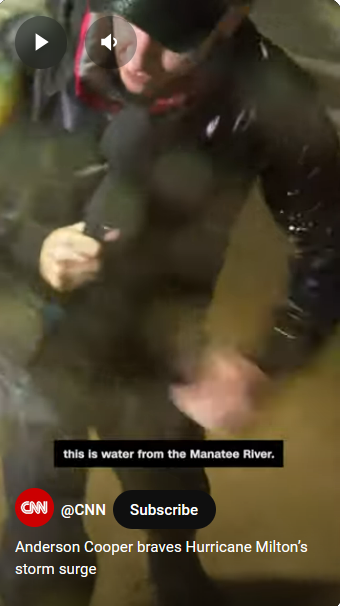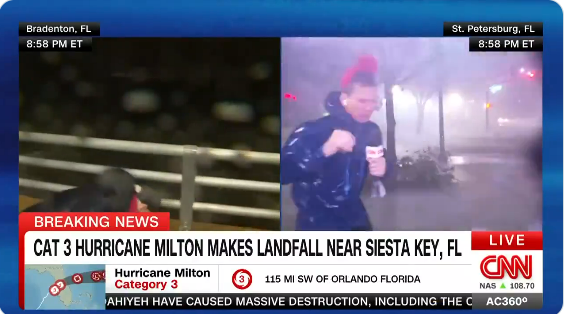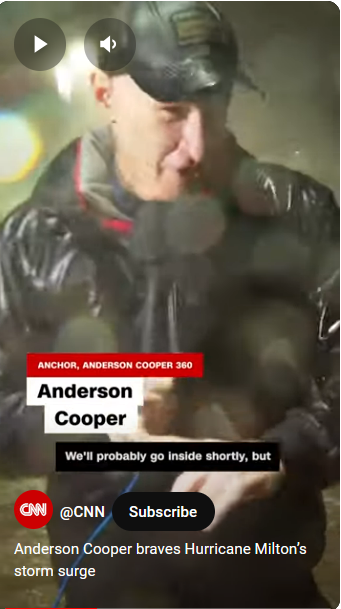When Hurricane Milton unleashed its powerful winds and relentless rain on Florida’s coastline, CNN’s Anderson Cooper was in the heart of the storm, risking his safety to deliver live updates. However, while reporting on the storm’s impacts, he was struck by debris—a startling moment that has brought the risks of journalism in extreme conditions into sharp focus. This incident, along with other related stories, sheds light on the lives of reporters on the front lines and the tragedies that unfold in the wake of such natural disasters.
Anderson Cooper’s On-the-Ground Reporting: Facing Hurricane Milton Head-On

As Hurricane Milton made landfall on Wednesday, October 9, 2024, Anderson Cooper, anchor of Anderson Cooper 360, was broadcasting live from Bradenton, Florida. Positioned just miles south of Tampa, he described the ferocity of the storm, which had already intensified to a Category 3 hurricane before reaching land. His commitment to capturing the storm’s full impact was evident, but it soon became a perilous assignment.
The Moment of Impact: Debris Strikes Cooper
While documenting the surge of water and the wind speeds, Cooper was struck by flying debris, which prompted him to exclaim, “Whoa, okay, that wasn’t good.” Fans immediately reacted, expressing concern for his safety on social media. Comments such as, “I am very concerned for his safety,” flooded Twitter, with many pleading for CNN to prioritize the safety of its on-ground reporters.
Cooper’s incident reminds us of the physical dangers journalists face in their pursuit of real-time news. The risks that come with storm reporting are immense, yet reporters like Cooper push forward, committed to informing the public.
The Destructive Force of Hurricane Milton
As Hurricane Milton tore through Florida, it left devastation in its wake, including destructive winds, torrential rains, and storm surges that flooded entire communities. The storm, which had briefly reached Category 5 status before making landfall, demonstrated nature’s overwhelming power.
Chaos and Destruction in St. Petersburg
Bill Weir, another CNN reporter, documented the chaos in St. Petersburg, Florida. As he braved the storm, the force of the winds was so strong that it blew his hat away. In downtown St. Petersburg, Makenna Caskey and her aunt sought shelter as a crane toppled from a building and crashed onto an adjacent structure. The crane’s fall was only a hundred feet from Caskey’s apartment, a harrowing reminder of how close they came to disaster.
The damage in Florida extended beyond structural destruction. Tragically, the storm spawned tornadoes, with one hitting a mobile home community in St. Lucie County, claiming lives and devastating families.
The Human Impact of Hurricane Milton
The toll of Hurricane Milton on the people of Florida is incalculable. Lives have been lost, homes destroyed, and entire communities are now facing the arduous process of rebuilding. Sheriff Keith Pearson of St. Lucie County reported that rescue efforts were ongoing in the mobile home community hit by a tornado. While he refrained from disclosing an official death toll, it’s believed that multiple fatalities have occurred, with emergency teams working to locate survivors.
Stories of Survival Amid Catastrophe
For the survivors of Hurricane Milton, the aftermath presents unimaginable challenges. Those like Makenna Caskey, who witnessed the crane collapse, must now process the trauma of narrowly escaping death. In other parts of Florida, families who lived in the destroyed mobile homes are left homeless and grieving loved ones lost in the storm. Amidst this tragedy, Anderson Cooper’s reporting draws attention to the human stories within the devastation, underscoring the resilience and strength of those affected.
Anderson Cooper: A Journalist’s Commitment to Humanity

Anderson Cooper’s career has been defined by a dedication to authentic, empathetic journalism. He has spent years covering events that reveal the rawness of the human experience, from conflicts abroad to disasters at home. His commitment to bearing witness to the suffering of others is well-documented, particularly his emphasis on humanizing tragedy and ensuring that individuals are not reduced to mere statistics.
Remaining Sensitive to Humanity
Cooper has spoken about the importance of remaining connected to humanity while covering difficult stories. In recounting his experiences, he shared a pivotal moment during his coverage of the Rwandan genocide, where he photographed a woman’s burnt body. He recalled feeling a profound sense of disconnection, a wake-up call that reminded him to never become numb to the people’s suffering.
This commitment to empathy shapes his approach to journalism, even in the face of Hurricane Milton. Cooper’s reporting goes beyond the destruction to highlight the resilience and heartache of those affected, bringing attention to the human cost of such disasters.
Inspiring the Next Generation: Anderson Cooper’s Lessons in Journalism

Anderson Cooper’s dedication to compassionate journalism has made him an inspiration to aspiring reporters worldwide. His resilience, integrity, and humanity serve as a blueprint for those who seek to enter the field. During a recent lecture, An Evening with Anderson Cooper, he encouraged students to engage in real conversations, emphasizing the importance of connecting with individuals beyond the headlines.
Learning from the World and Growing Through Experience
Cooper’s advice to students is simple yet profound: always be willing to learn. He emphasized that one of the best ways to grow as a journalist is through personal interactions with people from all walks of life. His philosophy is that journalism should be about listening, understanding, and storytelling, not just reporting facts.
Want to know what it feels like to be inside a hurricane? Turn on @CNN. Here's @BillWeirCNN losing his hat a few minutes ago: pic.twitter.com/EZNnpz3K6e
— Brian Stelter (@brianstelter) October 10, 2024
This perspective resonates with those who attended his lecture. Students like Sasha Meraj, a nursing student at Tarrant County College, found Cooper’s message to be a powerful reminder of the importance of compassion and empathy. By following his example, young journalists are reminded to approach their work with an open heart and a genuine desire to understand the lives they are documenting.
The Responsibility of News Organizations: Balancing Safety and Coverage
The recent incident involving Anderson Cooper highlights an important question: how should news organizations balance the need for coverage with the safety of their reporters? Hurricane Milton has sparked a conversation on this topic, as fans and viewers expressed concerns about Cooper’s safety, urging CNN to ensure their reporters are protected.
Should Reporters Be in Harm’s Way?
While storm reporting offers viewers critical real-time information, the physical risks cannot be ignored. The sight of Anderson Cooper being struck by debris has reignited the debate about how far reporters should go to bring news to the public. Many viewers took to social media to voice their concerns, with some demanding that CNN pull their reporters from the most dangerous locations.

News organizations are faced with a difficult task: balancing the public’s need for information with the obligation to protect their journalists. As we reflect on Cooper’s experience, we are reminded that journalists, too, are human, facing real dangers in their quest to bring truth to light.
Conclusion: The Courage to Bear Witness
Anderson Cooper’s coverage of Hurricane Milton reflects the courage, compassion, and commitment that define exceptional journalism. His willingness to confront danger serves as a testament to his dedication to the truth. From the chaotic streets of Bradenton to the lives of the people affected by the storm, Cooper’s reporting tells the story of resilience amid catastrophe.
As he continues to put himself in harm’s way, he reminds us that behind every news story is a human experience. In times of crisis, we rely on reporters like Cooper to connect us to the real people enduring these trials, and for that, we owe them our gratitude.


